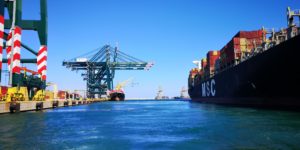
Aurelio Martínez participates in the meeting of the heads of the 12 most important ports in the world participating in the World Ports Climate Action Program (WPCAP)
The Port Authority of Valencia (PAV) joined this programme which promotes active programmes against climate change at the end of 2020
The president of the Port Authority of Valencia (PAV), Aurelio Martínez, participated in the meeting of the heads of the 12 most important ports in the world that form part of the World Ports Climate Action Program (WPCAP) in which the new actions of the working groups for 2021 were presented. The APV joined this initiative at the end of 2020, a programme that promotes synergies between the main port communities to act against climate change through specific measures to play an active role in the fight against global warming.
Specifically, Valenciaport is part of the WPCAP teams that are developing programmes for: the decarbonisation of terminals; favouring the goal of zero emissions from ships on docks; increasing the efficiency of logistics chains; and promoting common incentive policies for the reduction of emissions. The WPCAP is made up of the port facilities of Antwerp, Barcelona, Gothenburg, Hamburg, Le Havre, Long Beach, Los Angeles, New York/New Jersey, Rotterdam, Valencia, Vancouver and Yokohama.
The meeting, which was chaired by the CEO of the Rotterdam Port Authority, Allard Castelein, also took stock of the results of the different programmes that the WPCAP has in place. Initiatives in which all entities collaborate and in which the port community, such as shipping companies, terminals and energy suppliers, are involved in specific projects. Thus, for example, in the field of energy efficiency, the working group is identifying new measures to be adopted by the ports to reduce greenhouse gas emissions in maritime transport. In the field of incentive policies, the components of the WPCAP advocated aligning incentive programmes around common themes centred on CO2 reduction to speed up and simplify access to them.
Aurelio Martínez stressed “the commitment of the port facilities to play an active role in the ecological transition and decarbonisation with proposals that are embodied in specific projects that are producing results towards achieving our objectives, in the case of Valenciaport of 2030, zero emissions. Hence the importance of pooling and working together on these actions”. Thus, the president of the PAV explained the electrification project of the docks of the Port of Valencia, which is already advanced in the construction of an electrical substation that will allow the auxiliary engines of the ships to be connected to shore power while they are docked, the Power-to-ship system, one of the projects that form part of the working groups of the WPCAP.
The investments planned for the coming years in the Valenciaport area involve a series of sustainability commitments to achieve this goal of zero emissions. These investments are aimed at promoting the use of alternative energies to traditional fossil fuels such as hydrogen, renewable energies (photovoltaic, wind), LNG, without ruling out other alternatives.
Following the meeting of the group, the WPCAP issued a joint communiqué in which it reiterated its firm commitment to placing ports as the driving force behind the energy transition, reinforcing measures to improve energy efficiency in maritime transport, as well as coordinated and joint work so that ships can make use of green energy infrastructures supplied by port organisations and terminals, through the power-to-ship programme. The WPCAP focuses on concrete actions to combat climate change. To this end, port institutions work on specific projects, involving shipping lines, terminals and energy providers as much as possible to maximise the impact.
More information on WPCAP: https://sustainableworldports.org/wpcap-ports-take-new-series-of-climate-change-actions/

